Who can save us from Reform?
Mainstream parties need TradCons, the Melancholy Middle and Civic Pragmatists to switch sides
So, here’s the third in my series of posts unpacking the rich new data we have on the five tribes of Reform. This week, I take a look at the simple question: who exactly is going to save us from Reform? Who are the Reform-considering voters most likely to change their mind and return to the mainstream come election day?
Good politics requires good political strategy. And unless we have a clear answer to this question, progressive parties will fail to fine tune their offers, trade-offs and messages to take aim at those most likely to be persuaded to return from the fringes of Farage-land.
Our work with Best for Britain, The Policy Institute Kings College, Fairness Foundation, polling firm, YouGov and research agency Faster Horses, basically revealed there are three groups amongst the five tribes of Reform, where mainstream parties are in with a decent hope - and together these groups total over half of the Reform-considering vote. Persuade these people to return, and Reform will fail at the next election. If you fancy a listen to us chatting this through, here’s the fabulous Quiet Riot podcast.
Who are these three groups which could be persuaded to save us from Mr Farage in Number 10? They are:
Traditional Conservatives
The Melancholy Middle
and the Civic Pragmatists.
And here’s the most important thing to grasp: while lots are considering Reform, these three groups are much less likely to say they are ‘definitely considering’ voting for Reform. Indeed, only a third of the Civic Pragmatists put themselves in the ‘definite’ category, along with merely a quarter of the Melancholy Middle.
Question: On a scale of 0 to 10, where 0 means you would never consider voting for them, and 10 means you would definitely consider voting for them, how likely are you to consider voting for the following parties at the next election?
This is important because when we look at the breakdown of just how important each of these tribes are to Reform-coalition, we see that the three groups expressing the weakest affinity for Mr Farage’s teal offer account for over half -56% - of the Total Reform-considering vote.
Now, as you would expect, different parties have quite different potentials to turn these voters. Traditional Conservatives are not going to be picked up by the Labour Party. But 58% of TradCons would consider voting Tory. And the numbers for Civic Pragmatists and the Melancholy Middle are much more interesting for progressive parties. Indeed:
Amongst the Civic Pragmatists, 21% would consider voting Labour, 28% would consider the Lib Dems, and 26% would consider the Greens.
Meanwhile, 50% of the Melancholy Middle would consider the Tories, and 11% would consider Labour. Bigger chunks would consider the Lib Dems (19%) and Greens (15%)
Question: On a scale of 0 to 10, where 0 means you would never consider voting for them, and 10 means you would definitely consider voting for them, how likely are you to consider voting for the following parties at the next election? Voters expressing 6+
These numbers tells us one big important fact: today’s Reform-coalition is not one big homogenous block of voters. Today’s Reform coalition is sweeping together some quite different groups. Labour, the Lib Dems, the Greens - and above all, the Conservatives - all have voters in this coalition to aim for - if they can speak persuasively to the concerns which are forcing this coalition together for Reform.
I think these concerns are basically five-fold; living standards which feel under pressure - even those Reform-considerers who enjoy average or above average incomes feel more insecure than the ‘national average voter’; they live in precarious communities which they feel are in decline; they are more pessimistic about the future, extremely angry about broken politics - and crucially, more concerned and more negative about immigration.
As you can see, every single one of our five tribes of Reform, prioritises immigration and asylum as their number 1 issue - ranking it far higher than the national average.
Question: Which of the following do you think are the most important issues facing the country at this time? Please tick up to three.
But this data also reveals clues for the way in which the Reform coalition can be prised apart:
For our three key groups of potential switchers - Civic Pragmatists, the Melancholy Middle and Traditional Conservatives - the priority accorded to the Economy is in line with the GB-Average (52%).
Civic Pragmatists and the Melancholy Middle care a lot more a health than the more hard-core Reform-minded voters.
What is more, take a look at the data as a whole, and you find quite different views about the NHS, social security, Europe, climate change and the virtues of a ‘strong leader’
In our next big poll, we will have lots more to share about the kind of offer these voters want to see, their views on how to pay for it and the sort of messages that will resonate most.
There is not much I can add about Traditional Conservative. But for progressive parties, it makes sense to really get to understand the Melancholy Middle and the Civic Pragmatists in some detail. So, let’s meet them, with the help of our field study.
Meet the Civic Pragmatists
The Civic Pragmatists are the swing voters in waiting — torn between hope and despair, yearning for fairness yet angry at a politics they see as broken. There are more Labour votes here than anywhere else; but just to be clear: 70% of this group are not considering Labour - but 21% are.
Self-reliant, used to working and thinking for themselves, these folks might have voted Labour in 2024, but now feel let down by weakness of leaders and lack of 'change.' They have never been that political, are not especially loyal to parties and are least likely to vote Reform UK, because they are relatively more progressive, more patriotic, younger and more Millennial, socially open, with strong moral values and are more likely to blame the county’s predicament on the rich not paying taxes.
The soundtrack to their adult life has been Tory austerity; they have never really known anything else and now just wants a strong leader with a vision for real change who can take charge, get things done and really shake things up. They too are worried - 72% rank immigration amongst their top three concerns - as a system that just feels out of control, but they do not like the way the issue is whipped up by Farage.
They share with the wider populist bloc a sense of frustration at politics-as-usual, with three-quarters (76%) ‘somewhat agreeing’ that what is needed is a strong leader who is willing to break the rules - and like other Reform-minded voters they feel politicians are “completely out of touch with the normal general public, totally untrustworthy”. Yet, unlike their angrier counterparts, they are not consumed by despair. They are more financially secure, more likely to feel in control of their daily lives, and less inclined to see their local area in freefall.
Here’s a few quotes from Civic Pragmatists who joined in our field study, to give you a flavour of how they feel about life:
"I think it's going to be absolutely stinking for the younger generation, and I feel really sorry for them, and I feel they've been mis-sold a future by the powers that be." (M43, Edinburgh)
"I feel like there's no end in sight. I feel like we're never going to catch a break. Whenever your wages go up, all the bills go up. It just seems never ending. I feel like we are constantly moving the goalposts further away." (F33, Bristol)
"[Politicians] are completely out of touch with the normal general public, totally untrustworthy. They just really don't understand and shouldn’t really be able to run a country when they don't understand it." (F33, Bristol)
"Farage seems to be the only one giving it a go right now. Keir Starmer was elected on a change ticket but essentially has ended up being the same or worse. He has no real desire for change. The decisions he has made are the same sort that would have been made by the Tories. He could go after millionaires, rich landowners etc. but he instead goes after the OAP's and farmers." (M43, Edinburgh)
"I feel that there needs to be a lot of work on stopping the boat crossings and deterring people wanting to come to this country. For example, the benefit system, there should not be anything available. If somebody wants to come to this country, there should be a rite of passage.” (F33, Bristol)
"We should have a policy where we let professionals in and not just anyone that we don't even check. Criminals could be coming in, anything. So it's a massive issue we need to solve right now." (M26, Manchester)
Meet the The Melancholy Middle
The Melancholy Middle are the anxious heart of Britain today. They are the most economically secure, yet emotionally uneasy, segment of Reform-leaning voters. With median incomes of £35–39,999, they are more financially comfortable than other populist-inclined groups, and 44% say they are coping well.
Yet beneath this relative security lies a deep sense of national decline. Over eight in ten believe Britain is worse off than it once was, and half say their local area has deteriorated. Their concerns are anchored in bread-and-butter economics - 54% cite the economy as their top issue, well above the Reform average.
They are not as culturally hardline or authoritarian as other Reform segments - just 57% endorsing a “strong leader who breaks the rules” - but their outlook blends financial caution with disillusion in politics as usual.“
Life’s got more difficult and, you know, it is a little bit scary,” said one 67-year-old from Cambridgeshire. Others describe working families “going to food banks to feed their children,” or towns “shit on from a great height,” scarred by drugs, violence, and neglect. Immigration is a flashpoint - 73% would rank the issue amongst their top three concerns.
But as one woman in this group insisted, “It’s not about being racist. It’s about looking after all the people in this country who are poor, starving. We can’t keep supporting everybody.” Another added, “If I ruled this country, I’d look after our own people first.”
Figures like Farage are seen to give voice to this frustration - “he speaks mostly about how most people are thinking” - even if he has not sealed the deal. The Melancholy Middle are not driven by raw populist anger, but by a quiet erosion of optimism: the feeling that the deal they expected from life has been broken
Here’s a few quotes from Melancholy Middle who joined in our field study, to give you a flavour of how they feel about life:
"I think my expectations of life was that I'd get to retirement age and I'd be on holiday every month and having lots of fun and enjoying the rest of my days. I think life's got more difficult and, you know, it is a little bit scary."
(F67, Cambridgeshire)"I see so many elderly people out there who have got no money, can't afford to put the heating on."
(F60, Hertfordshire)"That shouldn't be right in this day and age that people go to work but still have to go to food banks to feed their children."
(F60, Bristol)"This town has got so much history. It's got more blue plaques than a lot of historical towns. And this town is not being looked after. It's been shit on from a great height. And I just think it's really sad. As time's gone on, with different nationalities moving in there's lots of shops that have been damaged there's lots of stabbings, and you as a woman would definitely not walk down the street on your own. Sadly, you just get people sitting around, drinking, taking drugs, doing drug deals."
(F67, Cambridgeshire)"People are afraid of talking about [immigration] because they’re scared of being called racist. But it’s not about being racist. It’s about looking after all the people in this country who are poor, starving. We can't keep supporting everybody."
(F60, Hertfordshire)"The illegal immigrants get all the help and given a home when there’s people who have payed their taxes all their lives and are now being punished."
(F67, Cambridgeshire)"If I ruled this country, I'd look after our own people first. We need to keep our noses out and start looking after the people that we've got here. The children that are hungry, the pensioners that need care but can't afford it. We need to start looking after our own folks before we start sticking our beaks in and getting involved in everybody else's nonsense. If America can vote for Trump and his views maybe Farage has a chance. I believe working class England has had enough and wants UK to be put first."
(F60, Hertfordshire)"Farage is a person who I believe has got his feet on the ground, not with everything, but he speaks mostly about how most people are thinking."
(F60, Bristol)
Conclusion
So there you have it. The first step in thinking about just how to beat Reform is to forget the idea that we are speaking to one group of people.
Without doubt, Reform-considerers share a priority concern around fixing the immigration system - but they have quite different views about many, many other things.
Some groups within the Reform coalition can be switched - and for progressive parties it feels to me like Civic Pragmatists and the Melancholy Middle must be the focus. So towards party conference season we will share exactly what they would like to see our politicians deliver.
Please share this on with anyone you think might find it of interest!


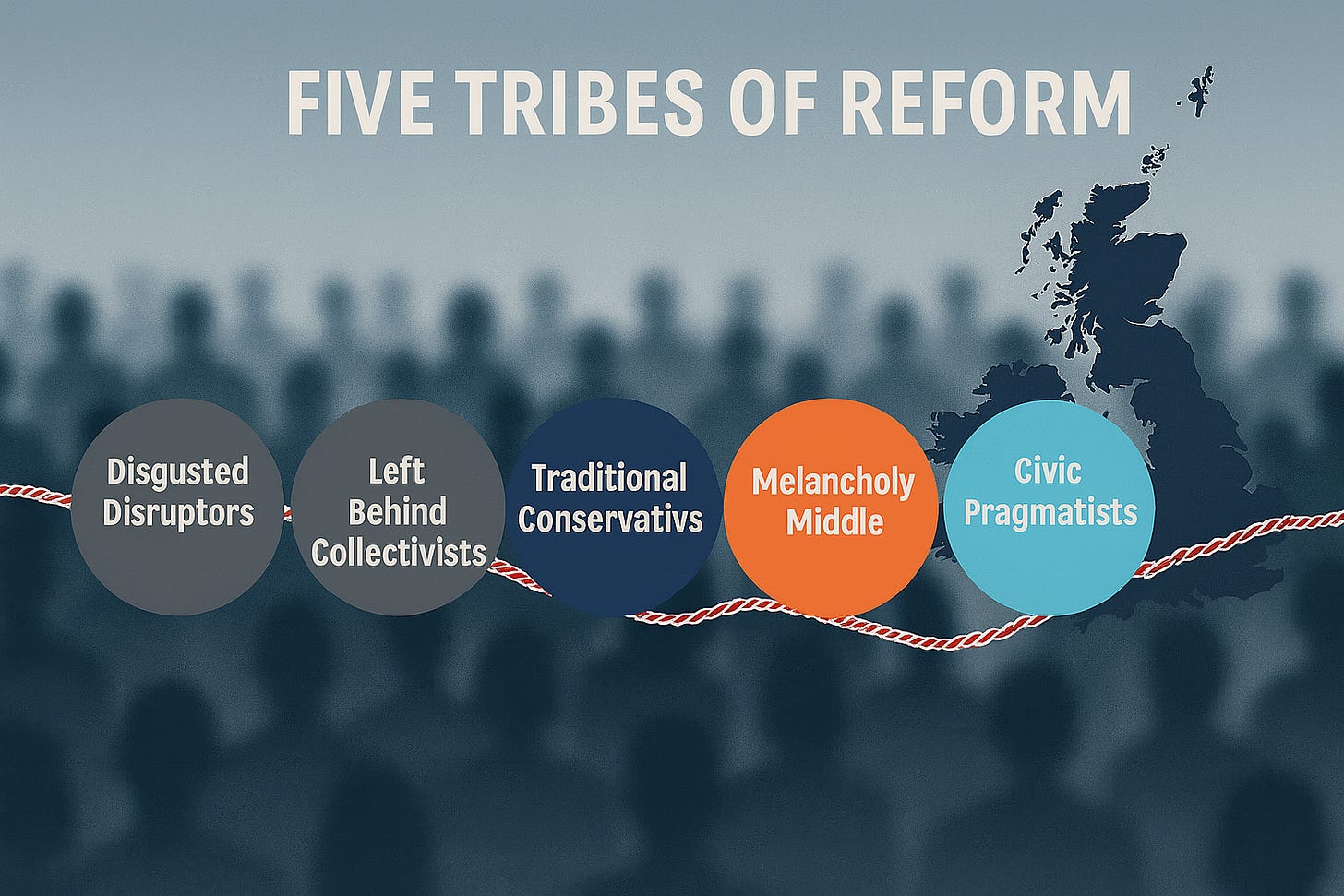
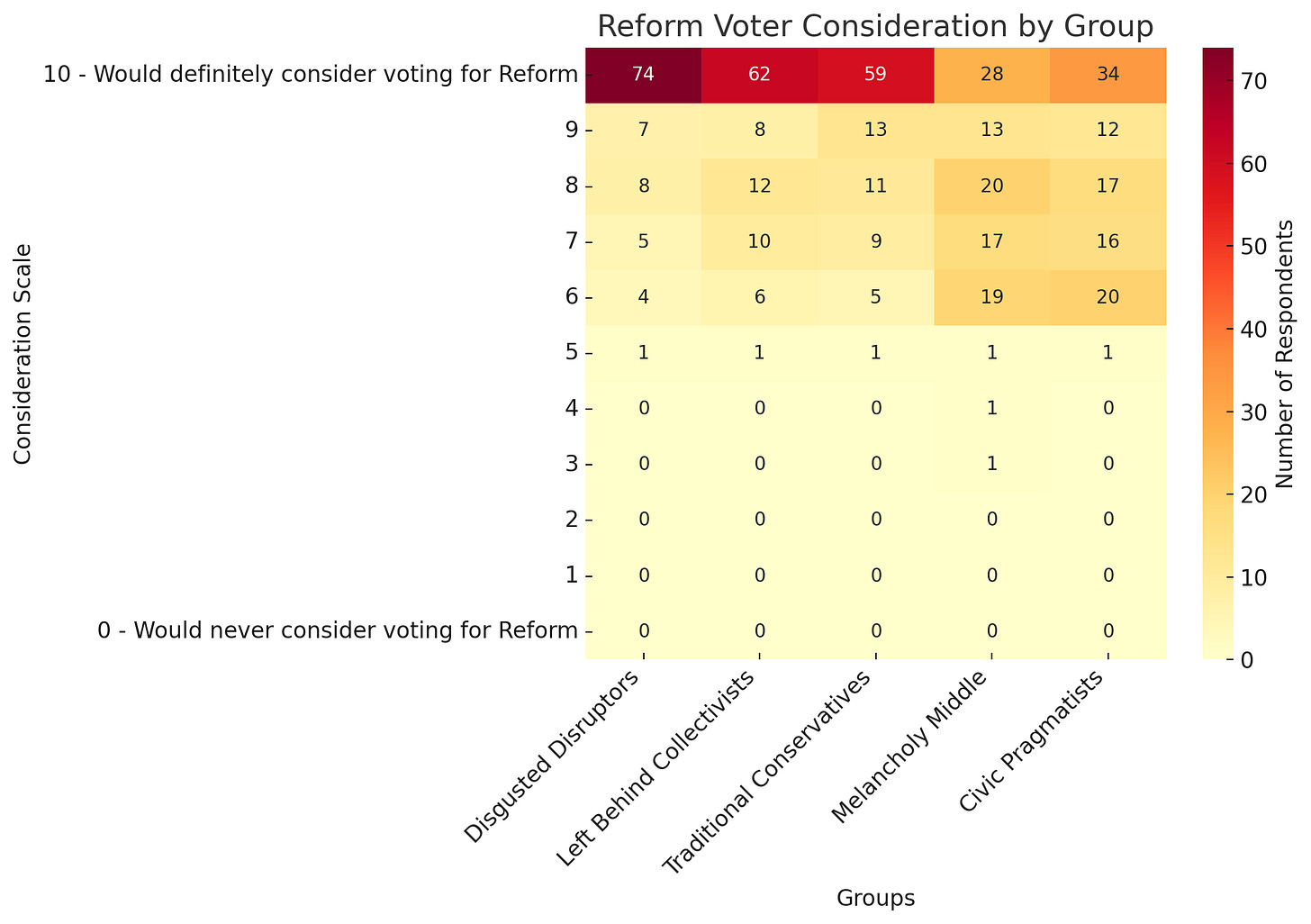
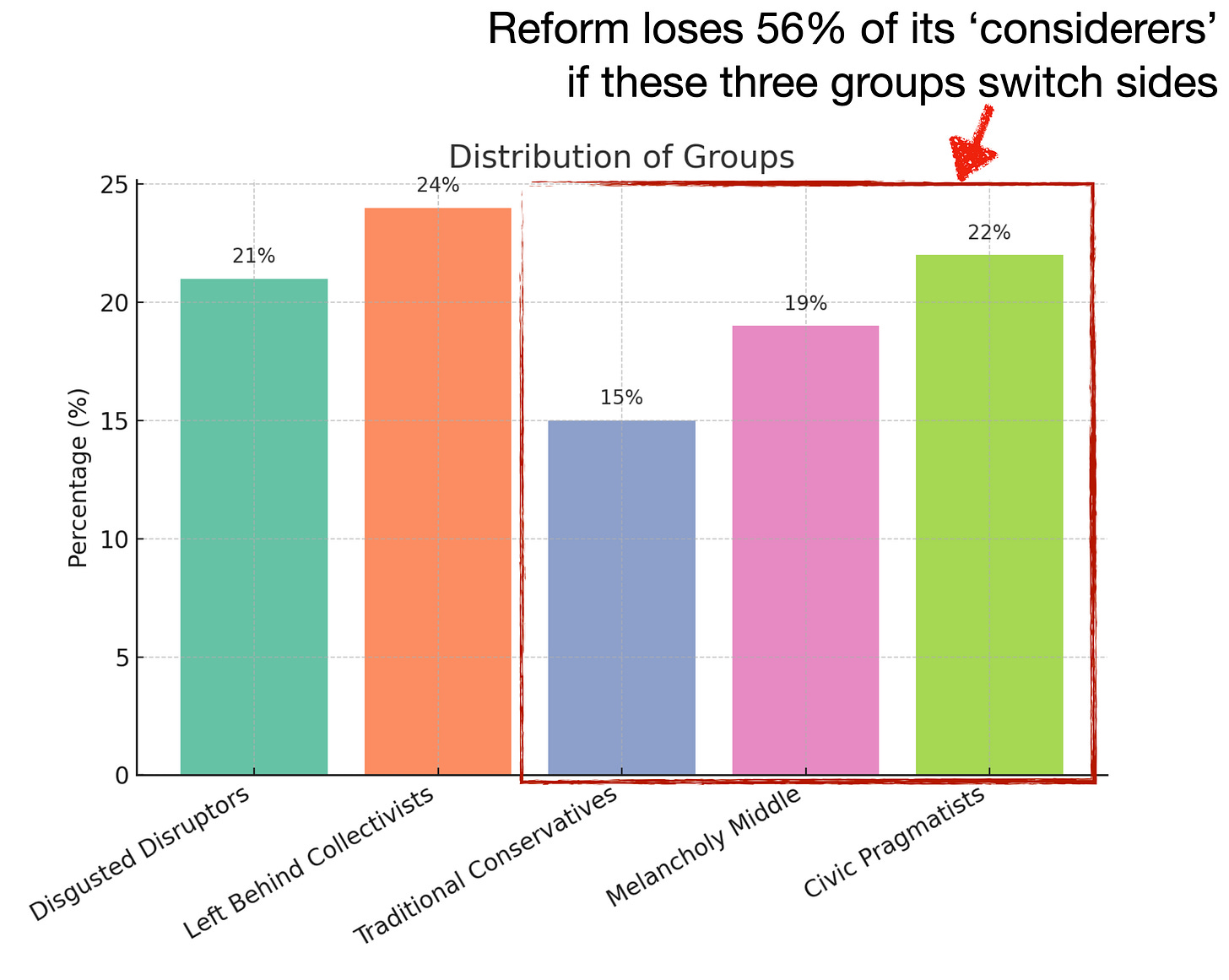

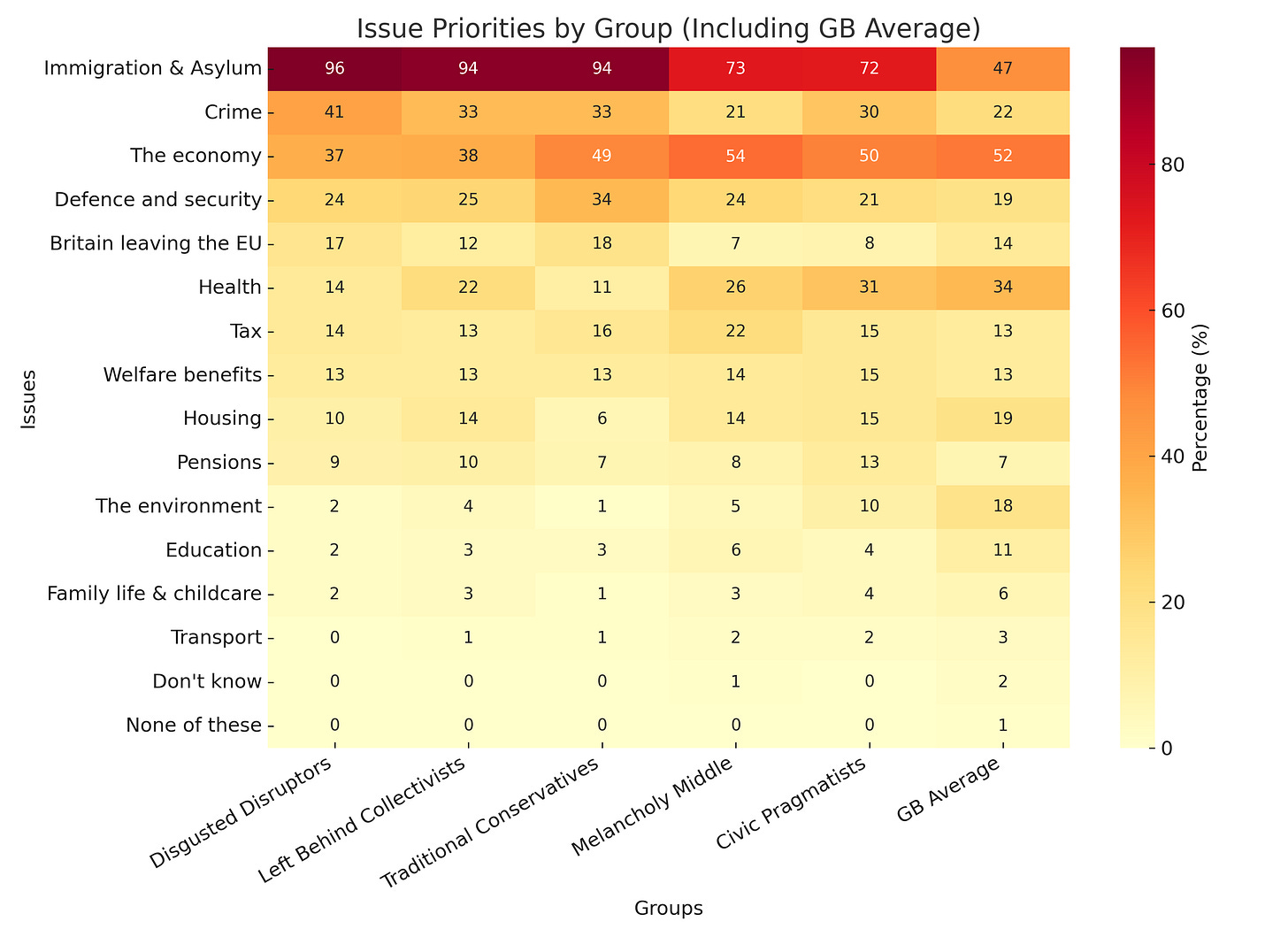
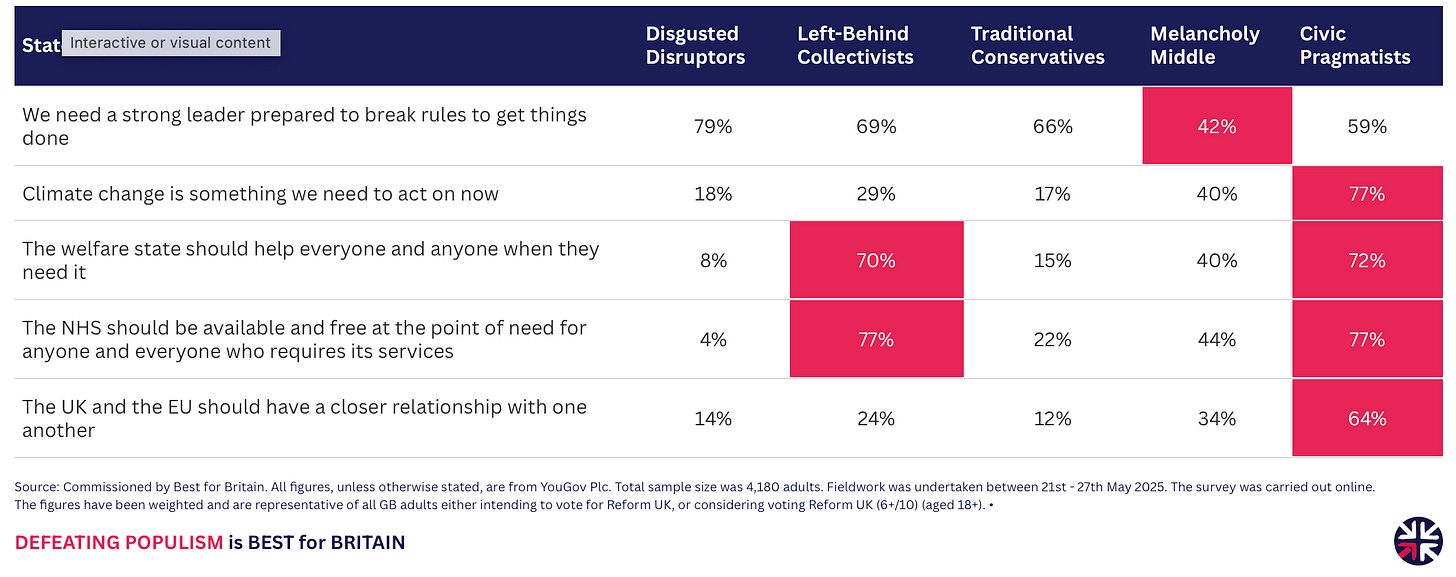
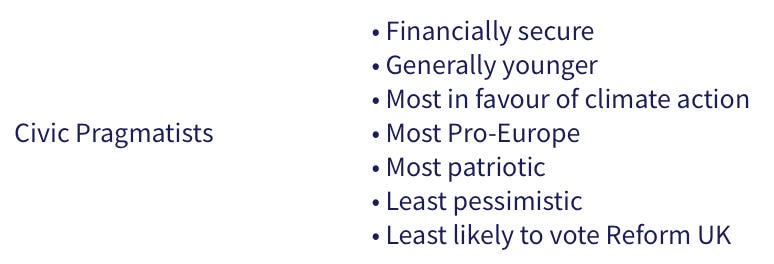
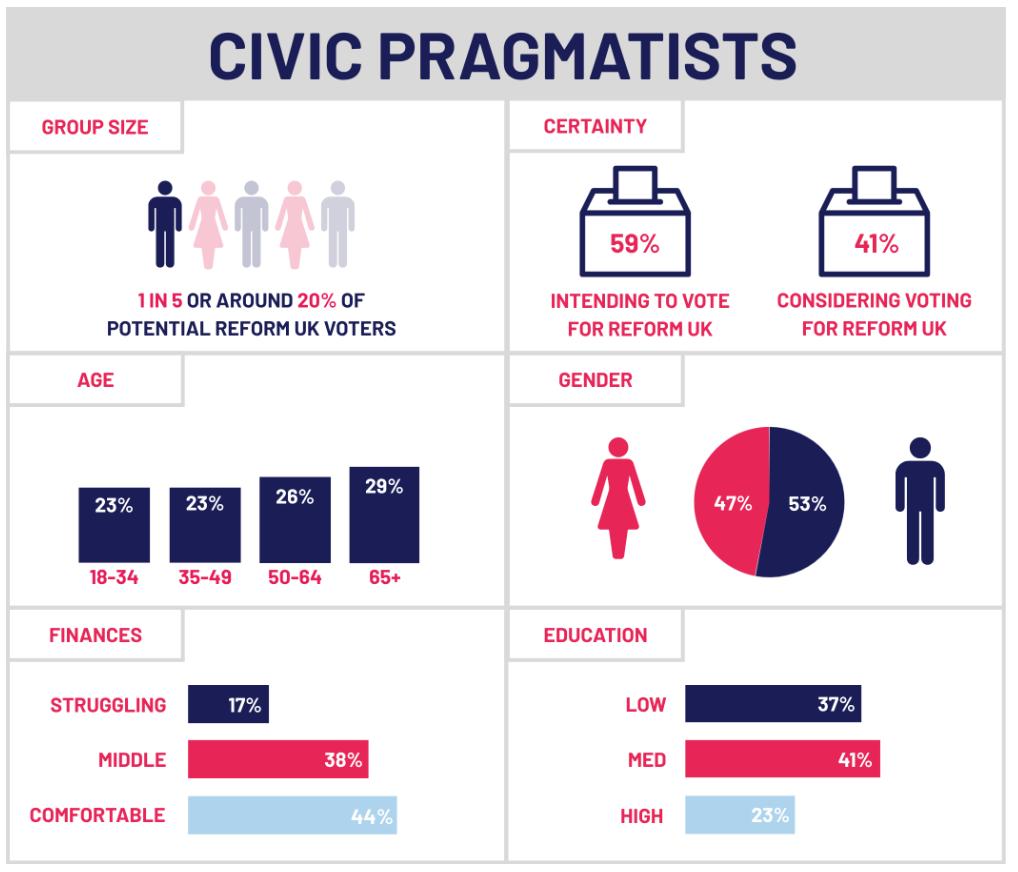
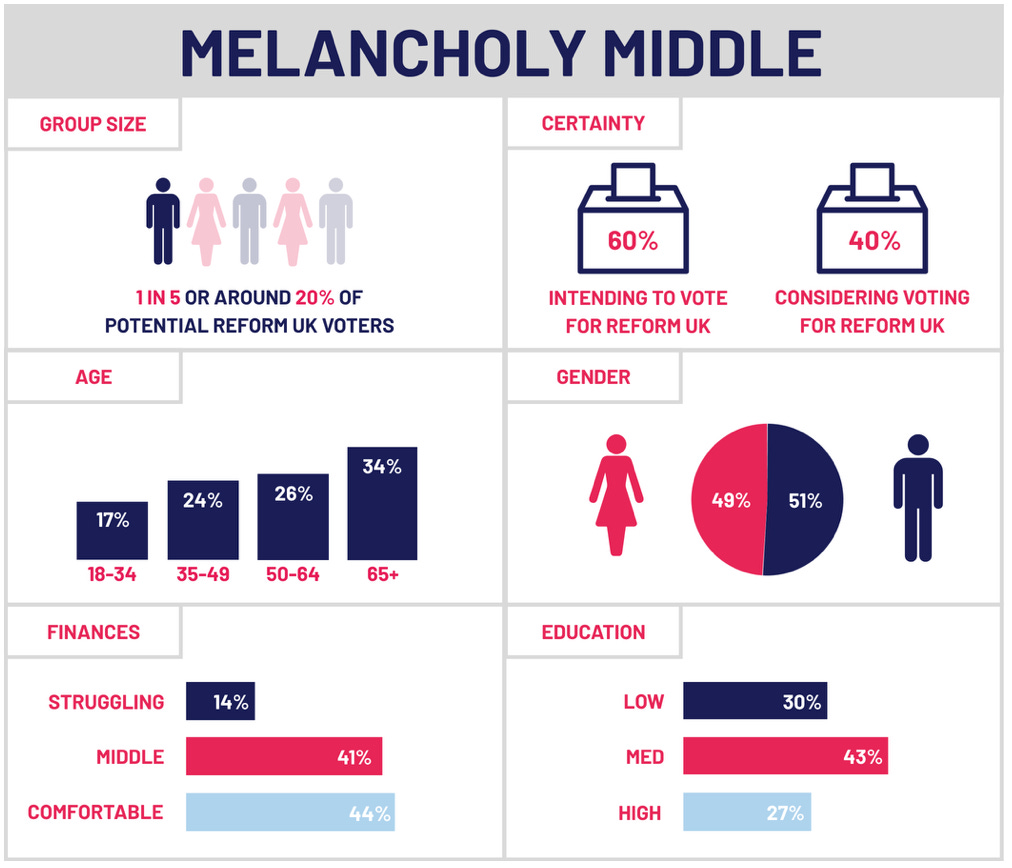
Hope I’m not being too complacent but travelling the country (seeing the bedraggled flags) and reading the populist post online I can’t help thinking that a small number of right wing people are stoking, with some success, a great deal of noise. My question is, how will this translate at the ballot box? Tentatively I’d judge now that Reform will fizzle out.
Prob a bit unfair to level this at you Liam as appreciate you’re not in government, but it does seem that all Labour is thinking about is political strategy, rather than any sort of governing strategy. Labour has power *now*. The point of governing is not just to ensure you remain governing.